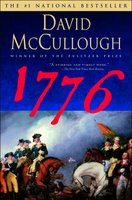 Great book!
Great book!McCullough depicts well the national morale from month to month, makes military maneuvers easy to understand for the normal person, and gives us George Washington's strengths and weaknesses as a military commander.
Every historian has to decide what to leave out, and McCullough doesn't deal much with the Continental Congress. His focus is on the army. Like the revolutionary founders, he knows that the Declaration on paper meant nothing if they couldn't back it up with force, so everything rode on the success (mere survival, early on) of the army. The declaration only gets a few pages, but he makes up for it in quality, showing how the declaration boosted the morale of the army at a much needed time.
He includes several instances where Washington or others attribute fortuitous events to Divine Providence - retreating over a river at night but not completing the move by daylight, thus vulnerable to an attack that would have ended the rebellion, a heavy fog descended to give them more time before the British noticed anything.
We also see how much advantage there is in being underestimated by your enemy. The British command was caught off guard and overconfident throughout the year. But the "rabble in arms" turned out to have a spirit that couldn't be crushed, even by tens of thousands of professional soldiers fighting a small band of half that, during 1776.
I really enjoyed this one too steve. I loved to hear the stories of divine intervention.
ReplyDeleteThe most inpacting thing that I took away from this one was the way that heroes are formed when men of character connect with the opportunity of a crisis. Henry Knox's epic mission to retrieve cannons from Fort Ticonderoga was my favorite example of this. Good stuff!